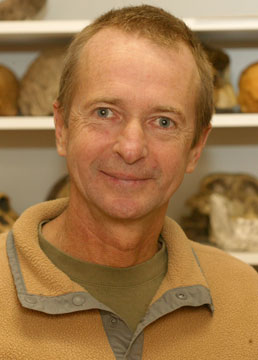 The Wabash College Lecture Committee invites you to a lecture by Dr. Peter Brown, on Monday, September 19, at 8 p.m. in Salter Hall in the Fine Arts Center. This is Brown’s first U.S. college campus visit following his team’s discovery of the human skeletons of a small species dubbed the "Hobbit People." The title of his talk is "A Revolution in Evolution: Rewriting Evolutionary History."
The Wabash College Lecture Committee invites you to a lecture by Dr. Peter Brown, on Monday, September 19, at 8 p.m. in Salter Hall in the Fine Arts Center. This is Brown’s first U.S. college campus visit following his team’s discovery of the human skeletons of a small species dubbed the "Hobbit People." The title of his talk is "A Revolution in Evolution: Rewriting Evolutionary History."
Dr. Brown’s team discovered the human skeletal remains named Homo floresiensis on the island of Flores, which is east of Bali and midway between Asia and Australia. The original skeleton, a female, stood just one meter in height and weighed only 55 pounds at the time of her death 18,000 years ago. Dr. Brown published his findings in an October 2004 issue of Natural Science; the National Geographic Society has also published the results. Researchers estimate that the tiny people lived on Flores from about 95,000 years ago until at least 13,000 years ago. Dr. Brown’s team bases its theory on charred bones and stone tools found on the island. The tools, according to Brown, were used to hunt big game.
"Despite its smaller body size, smaller brain, and mixture of primitive and advanced anatomical features, the new species falls firmly within the genus Homo," wrote Hillary Mayell for the National Geographic News.
"The researchers speculate that the hobbit and her peers evolved from a normal-size, island-hopping Homo erectus population that reached Flores around 840,000 years ago."
Brown was born in Sydney, and educated in Sydney and Canberra. He has had a life-long interest in living things which resulted in a focus on zoology, primatology, and evolutionary biology when he was an undergraduate at the Australian National University. As a postgraduate student, Brown’s research concentrated on the origins and evolution of people in the Australian and Asian regions—a broad research theme which has kept him busy with museum collections, field work, and the laboratory for more than 20 years. His research has taken him from the arid center of Australia to the coast, China, Japan, India, and Indonesia, and museum collections in other parts of the world.
Brown gained a tenured lectureship at the University of New England, Australia in 1981 and has developed undergraduate courses in human evolution, forensic anthropology, and paleoanthropology. In 2002-2003 he was the international research professor at Tohoku University Medical School in Japan, and is now Professorial Fellow in Palaeoanthropology at the University of New England, Australia. He has been an invited speaker in the United States, United Kingdom, China, Japan, India, Germany, and South Africa.
Brown’s talk is free and open to the public.
For more information see: